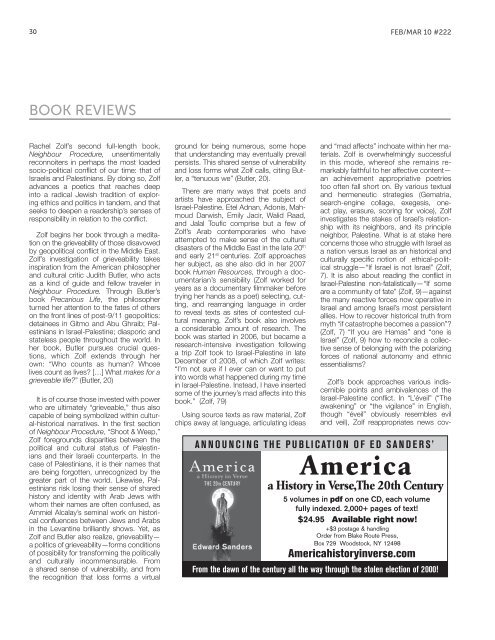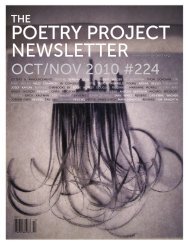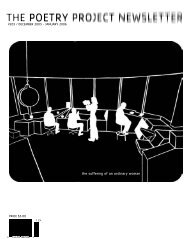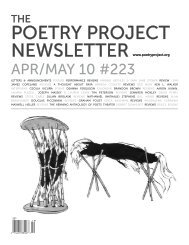Create successful ePaper yourself
Turn your PDF publications into a flip-book with our unique Google optimized e-Paper software.
30 FEB/MAR 10 #222<br />
BOOK REVIEWS<br />
Rachel Zolf’s second full-length book,<br />
Neighbour Procedure, unsentimentally<br />
reconnoiters in perhaps the most loaded<br />
socio-political conflict of our time: that of<br />
Israelis and Palestinians. By doing so, Zolf<br />
advances a poetics that reaches deep<br />
into a radical Jewish tradition of exploring<br />
ethics and politics in tandem, and that<br />
seeks to deepen a readership’s senses of<br />
responsibility in relation to the conflict.<br />
Zolf begins her book through a meditation<br />
on the grieveability of those disavowed<br />
by geopolitical conflict in the Middle East.<br />
Zolf’s investigation of grieveability takes<br />
inspiration from the American philosopher<br />
and cultural critic Judith Butler, who acts<br />
as a kind of guide and fellow traveler in<br />
Neighbour Procedure. Through Butler’s<br />
book Precarious Life, the philosopher<br />
turned her attention to the fates of others<br />
on the front lines of post-9/11 geopolitics:<br />
detainees in Gitmo and Abu Ghraib; Palestinians<br />
in Israel-Palestine; diasporic and<br />
stateless people throughout the world. In<br />
her book, Butler pursues crucial questions,<br />
which Zolf extends through her<br />
own: “Who counts as human? Whose<br />
lives count as lives? […] What makes for a<br />
grieveable life?” (Butler, 20)<br />
It is of course those invested with power<br />
who are ultimately “grieveable,” thus also<br />
capable of being symbolized within cultural-historical<br />
narratives. In the first section<br />
of Neighbour Procedure, “Shoot & Weep,”<br />
Zolf foregrounds disparities between the<br />
political and cultural status of Palestinians<br />
and their Israeli counterparts. In the<br />
case of Palestinians, it is their names that<br />
are being forgotten, unrecognized by the<br />
greater part of the world. Likewise, Palestinians<br />
risk losing their sense of shared<br />
history and identity with Arab Jews with<br />
whom their names are often confused, as<br />
Ammiel Alcalay’s seminal work on historical<br />
confluences between Jews and Arabs<br />
in the Levantine brilliantly shows. Yet, as<br />
Zolf and Butler also realize, grieveability—<br />
a politics of grieveability—forms conditions<br />
of possibility for transforming the politically<br />
and culturally incommensurable. From<br />
a shared sense of vulnerability, and from<br />
the recognition that loss forms a virtual<br />
ground for being numerous, some hope<br />
that understanding may eventually prevail<br />
persists. This shared sense of vulnerability<br />
and loss forms what Zolf calls, citing Butler,<br />
a “tenuous we” (Butler, 20).<br />
<strong>The</strong>re are many ways that poets and<br />
artists have approached the subject of<br />
Israel-Palestine. Etel Adnan, Adonis, Mahmoud<br />
Darwish, Emily Jacir, Walid Raad,<br />
and Jalal Toufic comprise but a few of<br />
Zolf’s Arab contemporaries who have<br />
attempted to make sense of the cultural<br />
disasters of the Middle East in the late 20 th<br />
and early 21 st centuries. Zolf approaches<br />
her subject, as she also did in her 2007<br />
book Human Resources, through a documentarian’s<br />
sensibility (Zolf worked for<br />
years as a documentary filmmaker before<br />
trying her hands as a poet) selecting, cutting,<br />
and rearranging language in order<br />
to reveal texts as sites of contested cultural<br />
meaning. Zolf’s book also involves<br />
a considerable amount of research. <strong>The</strong><br />
book was started in 2006, but became a<br />
research-intensive investigation following<br />
a trip Zolf took to Israel-Palestine in late<br />
December of 2008, of which Zolf writes:<br />
“I’m not sure if I ever can or want to put<br />
into words what happened during my time<br />
in Israel-Palestine. Instead, I have inserted<br />
some of the journey’s mad affects into this<br />
book.” (Zolf, 79)<br />
Using source texts as raw material, Zolf<br />
chips away at language, articulating ideas<br />
and “mad affects” inchoate within her materials.<br />
Zolf is overwhelmingly successful<br />
in this mode, whereof she remains remarkably<br />
faithful to her affective content—<br />
an achievement appropriative poetries<br />
too often fall short on. By various textual<br />
and hermeneutic strategies (Gematria,<br />
search-engine collage, exegesis, oneact<br />
play, erasure, scoring for voice), Zolf<br />
investigates the stakes of Israel’s relationship<br />
with its neighbors, and its principle<br />
neighbor, Palestine. What is at stake here<br />
concerns those who struggle with Israel as<br />
a nation versus Israel as an historical and<br />
culturally specific notion of ethical-political<br />
struggle—“If Israel is not Israel” (Zolf,<br />
7). It is also about reading the conflict in<br />
Israel-Palestine non-fatalistically—“If some<br />
are a community of fate” (Zolf, 9)—against<br />
the many reactive forces now operative in<br />
Israel and among Israel’s most persistent<br />
allies. How to recover historical truth from<br />
myth “if catastrophe becomes a passion”?<br />
(Zolf, 7) “If you are Hamas” and “one is<br />
Israel” (Zolf, 9) how to reconcile a collective<br />
sense of belonging with the polarizing<br />
forces of national autonomy and ethnic<br />
essentialisms?<br />
Zolf’s book approaches various indiscernible<br />
points and ambivalences of the<br />
Israel-Palestine conflict. In “L’éveil” (“<strong>The</strong><br />
awakening” or “the vigilance” in English,<br />
though “éveil” obviously resembles evil<br />
and veil), Zolf reappropriates news cov-<br />
A n n o u n c i n g th e P u b li c Ati o n o f e d S A n d e r S’<br />
America<br />
a History in Verse,<strong>The</strong> 20th Century<br />
5 volumes in pdf on one CD, each volume<br />
fully indexed. 2,000+ pages of text!<br />
$24.95 Available right now!<br />
+$3 postage & handling<br />
Order from Blake Route Press,<br />
Box 729 Woodstock, NY 12498<br />
Americahistoryinverse.com<br />
from the dawn of the century all the way through the stolen election of 2000!

















